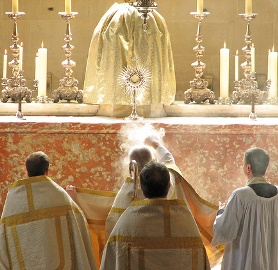
As we prepare to celebrate the Solemnity of the Body and Blood of Christ this weekend, perhaps you'll find this poem from the Concord Pastor helpful for your prayer.
Bread
Unless a grain of wheat falls into the earth and dies,
it remains just a grain of wheat,
but if it dies, it bears much fruit...
You have to listen with all of you
to hear the white-green shoot
pushing, rubbing, scraping up through
cool, moist earth: wheat being born.
It's a comforting sound when, finally,
you hear it and you know the growing sound
isn't in the field
but in your fragile frailty,
in you...
Then fear comes over you:
you will be torn inside, again, until it hurts
and this may be the time
when growing leaves behind
the one you think you are,
harvesting the one you were made to be...
Unless a grain of wheat falls into the earth and dies,
it remains just a grain of wheat,
but if it dies, it bears much fruit...
You don't have to listen so closely
to hear the wind shuffle its way
through fields of wheat
so you have to look very carefully
to see it's not the wind after all, but simply
wheat brushing against wheat,
wheat supporting wheat,
wheat enjoying wheat,
wheat embracing wheat.
The rustling becomes a symphony
of meeting, knowing, touching, growing:
wheat reaching out to wheat
not with fear, not with flushed face,
but only with the need to touch
and the sound of reaching
is strong, enveloping, alive!
Unless a grain of wheat falls into the earth and dies,
it remains just a grain of wheat,
but if it dies, it bears much fruit...
Grinding grains of wheat: harsh,
breaking, crushing sounds,
a not soft noise - hard.
And now you don't want to hear
wheat being crushed:
it just doesn't look like wheat anymore
and maybe the explosion in you
wasn't a matter of life but...
water is cool
and now it is all around you:
bubbling and swirling
in flour ground of wheat
and now you're not surprised to know
you're listening to blood filling your veins,
flowing all through you: life.
And just before the fire consumed us, too,
we found bread: one beautiful brown loaf
of wheat, wind, water
all rising to life in bread.
Then came One
who broke himself like a loaf
and we heard
in the cracking and tearing of the crust
the Word of life grown, ground and given
for those who share
in the breaking of the bread.
Unless a grain of wheat falls into the earth and dies,
it remains just a grain of wheat,
but if it dies, it bears much fruit...























